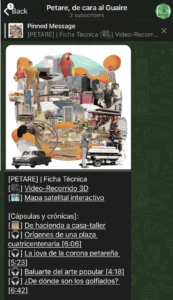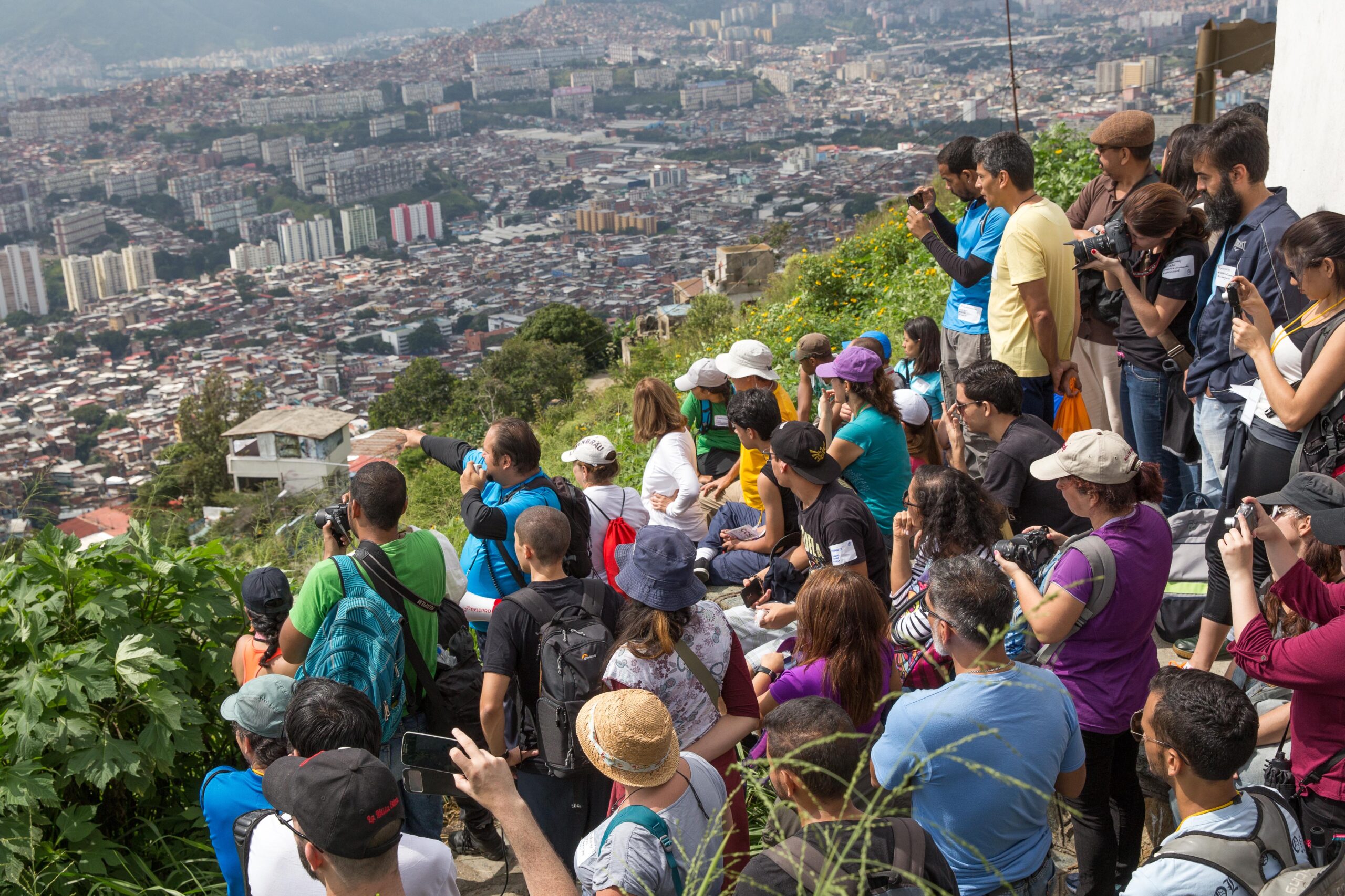By Penélope Plaza
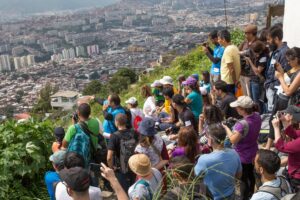
Introduction:
Creating a Digital [CCSen365] is a collaboration between Venezuelan not-for-profit design practice Collectivox and the School of Architecture at University of Reading to explore the appropriate digital platforms to create a ‘virtual’ [CCSen365], a programme of heritage re-interpretation created by Collectivox in 2016. After years of successfully implementing [CCSen365] on-site, attracting participants via word-of-mouth, SMS and social media, the restrictions brought by Covid-19 and the post-pandemic period led Collectivox to consider alternatives for delivering these experiences in a digital format in a very challenging context of deficient digital infrastructure. Furthermore, the state of disrepair of sidewalks and automobiles invading the public realm had increasingly rendered the walks unintendedly ‘ableist’ in an urban setting hostile to people with disabilities. The aim was to discover how to provide a similarly meaningful and universally accessible experience of [CCSen365] in the digital realm responsive to the Venezuelan socio-economic context. Venezuela has the slowest internet speeds in the world, a large proportion of the population access the internet only via mobile phone on pay-as-you-go (an estimate of 79.6% according to the Observatorio Venezolano de Servicios Públicos, 2021, p. 50) who earn the lowest minimum wage in Latin America (USD 3.50 per month at the official exchange rate).
Collectivox works at a micro urban scale to catalyse opportunities of meaningful and inclusive social interactions with heritage, understanding the interdependencies between local cultural context, the built environment of Caracas (González Viso, Peña and Vegas, 2015) and the needs and desires for social interactions aided by digital technology, which were magnified by the Covid-19 pandemic. The primary audience of Creating a Digital CCSen365 are residents of Caracas, who are active users of internet and social media via mobile phone who may lack affordable and accessible cultural activities for spending their time of leisure.
This project used a mix of service design tools and qualitative methods to gather data, facilitate team discussions and co-develop a prototype for Digital [CCSen365]. This enriched the insights gained through the analysis of the pre-existing on-site storytelling heritage walks, and our research of the Venezuelan digital infrastructure and socioeconomic context combined with case studies using digital technologies for community engagement. The Venezuelan socio-cultural context and the existing digital ecosystem of local residents was considered at every stage, driving the choice of using Telegram as a free, readily available and popular digital platform to make the digital experience as inexpensive and accessible as possible. The key functional features that make Telegram ideal are: the content is stored in the cloud meaning that users don’t spend their own data allowances; it doesn’t require a separate signing up to a standalone app; unlike platforms like WhastApp it enables the protection of the IP of the heritage storytelling guides by not allowing the forwarding of messages. More importantly, hosting the digital heritage walks on Telegram ensured the content would be accessible to people with disabilities, and potentially the Venezuelan diaspora.
The digital journey was consolidated into a rough prototype titled Historias Urbanas para Todos (Urban Stories for All) built as a Telegram channel based on a pre-existing CCSen365 physical urban walk of the neighbourhood of Petare in Caracas. The prototype journey Petare, de cara al Guaire (Petare, Facing the Guaire River) is composed by a mix of route maps, audio recordings with transcripts, short videos with captioning, access to an image bank of Petare, a link to give feedback on the journey, and a link to access more information and contact the organisers. Having successfully tested the rough prototype of Historias Urbanas para Todos in a focus group, CollectiVox has been seeking funding (a challenge considering the restrictions to international funding in Venezuela) to develop, refine and implement the digital experience on Telegram as an exemplar of a low-cost, low-data platform to expand access to local heritage in contexts with deficient digital infrastructure and digital poverty.
Breakthrough Studies:
Meaningful social interactions, particularly when transferred to digital platforms, do not happen in a vacuum. Culture and design are deeply intertwined, as Arturo Escobar asserts in Designs for the Pluriverse (2017), paraphrasing Anne Balsamo, “design is about creating cultural meanings and practices, about designing culture, experience and particular ways of living” (Escobar, 2017, p. 2). To catalyse opportunities for meaningful social interactions with cultural heritage in the digital realm, we must begin by working at a micro scale to understand the interdependencies between the cultural context, the built environment, the needs and aspirations of social interactions of potential users and use of digital technology (Design Council and The Point People, 2021, pp. 9–11). To this end, the research sits within the principles of Social Innovation, defined as new ideas that effectively meet social needs and simultaneously foster meaningful social relationships and/or collaborations (Bureau of European Policy Advisers BAPE, European Commission and Hubert, 2010, p. 7). More specifically, drawing on BAPE’s three categories of Social Innovation, Creating a Digital CCSen365 fits the first category: “grassroots social innovations that respond to pressing social demands not addressed by the market and are directed towards vulnerable groups in society” (2010, p. 7). Design for Social Innovation belongs to a “subset of design practices, research and education applied within the multidisciplinary field of social innovation” (Amatullo et al., 2021). It is informed by the notion of “change in the way of living” (Sangiorgi and Scott, 2015, p. 128) achieved through small interventions within wider frameworks. Therefore, design for Social Innovation is by nature a “multi-stakeholder, intensely collaborative, and social” endeavour (Amatullo et al., 2021). As such, this research put the emphasis on meaningful social interactions and local cultural heritage, understanding the constraints in digital and mobility infrastructure as an opportunity to create less resource-intensive and contextually sensitive ways of using digital platforms.
In the context of this project we understand practice as the overarching frame that encompasses design and research: designers practice design just as scientists practice research (Faste & Faste, 2012, p. 5). Under this model, research is a kind of design, a definition that aligns research with creative practice, allowing for a broader range of outputs such as objects, exhibitions and in the case of this project, a low-data digital experiences, as “the embodiment of research knowledge” (Frayling, 1994, p. 5; Faste and Faste, 2012, p. 7). We approached Creating a Digital [CCSen365] as design that operates intentionally as “embedded design research” culminating in the proposal of a conceptual “artefact” (the protoype Historias Urbanas para Todos) that embodies the new knowledge produced and acquired.
The following six case studies served as key references to the development of Digital CCSin365:
Send Me SFMoMA is an initiative by the San Francisco Museum of Modern Art. It is a SMS chatbot service that provides an approachable, personal, and creative method of sharing the breadth of SFMOMA’s art collection with the public.
Statue Stories Chicago is a free public art initiative that seeks to bring Chicago’s iconic statues to life. The project gathered Chicago’s celebrated actors, writers and theatres to give these statues a voice through a combination of drama, humour and location technology.
Amor de Cuarentena (Love in Quarantine). At the height of the COVID-19 pandemic, many theatre companies and actors had to re-think new ways to continue engaging audiences and continue to generate revenue. Amor de cuarentena (Love in Quarantine) was a performance-based experience delivered via personal audio voice notes using the messaging platform WhatsApp.
A Garden Through Time is a project created by writer and storyteller Matthew Bellwood and audio producer Rosie Parsons, with funding from Leeds Inspired. It consists of a series of audio walks around the footprint of the Leeds Zoological and Botanical Gardens which existed in Headingley, Leeds, United Kingdom, between 1840 and 1858. The creators mapped a walk that traces the pre-existing gardens using newspaper and museum archives, as well as physical traces that have been left behind. They also worked with people living near to the Gardens’ former site, to bring to life some of the historical texts that tell the story of the gardens. They also commissioned five local artists to create their own responses to the gardens and their history.
Leadership through Storytelling is a free training course developed by Grassroot (South Africa) and MIT Governance Lab (USA) that uses WhatsApp for the greater good. The storytelling content is based on Harvard Professor Marshall Ganz’s “Public Narrative” work, which focuses on identifying sources of hope and motivation to build shared visions for future change. Piloted in 2019, and now ongoing, the course trains and connects grassroot community leaders online so they can improve on their leadership capacity to communicate more effectively with their communities. It is designed to work in low-resource settings with limited connectivity, where environments can be unpredictable.
Hello Lamp Post is a community engagement project developed by PAN Studio that invites people to interact playfully with their built environment using an SMS platform. The project uses common public space objects usually taken for granted such as lamp posts, bollards and benches to create SMS dialogues with citizens to help them look at their area with fresh eyes. Commissioned for Queen Elizabeth Olympic Park by the London Legacy Development Corporation with funding from the EU Climate KIC initiative, Hello Lamp Post London ran between 2017 and 2020. It was specifically used to provide the Olympic Park’s residents, workers and visitors immediate and up-to-date information, in a meaningful yet playful way, regarding the park development sites (purpose, timeframes and the benefits they would bring), whilst also allowing them to explore the park’s amenities and points of interest.
We explored examples of innovative approaches to engaging audiences using simple and accessible digital technology, in relation to a set of inter-related themes: urban mapping, community engagement and citizen participation, inclusive digital platform, storytelling, urban walks and digital events.
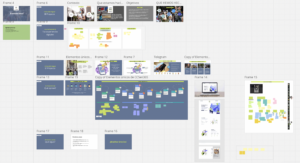
Methodologies:
We used a mixture of Service Design Tools (hypothesis generation, brainstorming, experience principles, concept walkthrough, participant target journey, rough prototyping) and qualitative methods such as semi-structured interviews and focus group to facilitate team discussions and collaboratively develop the concept for Digital [CCSen365].
The semi-structured interviews were carried out via Zoom with five experts from Venezuela and the United Kingdom, from a variety of disciplines: architecture, psychology, universal accessibility, inclusive design, and smart cities. This provided us with an international outlook of the advantages and opportunities for engagement with local heritage provided by physical and digital platforms, as well as the potential barriers to widening engagement through digital means, particularly in Venezuela, considering the deficient digital infrastructure, the ongoing economic and political crisis and the absence of an unified national policy on universal access.
We carried out one focus group activity to gather impressions and receive feedback on our rough prototype for Digital CCSin365. This allowed us to use small group dynamics to promote a discussion, idea sharing and debate regarding the rough prototype to understand the initial response of the potential audience by encouraging participants to share their views openly. We used prompts and questions to ensure the discussion points we were interested in were covered in the session. Due to geographical restrictions, the focus group was conducted as an interactive online session via Zoom using a shared Miro Board.
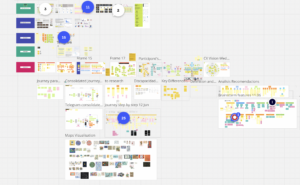
The Impact of the research on policy and practice:
This project employed contextual user-centred design research approach to respond to the difficulties posed by the situation in Venezuela. The research made valuable contributions in highlighting the challenges of conceptualising meaningful digital experiences in contexts with widespread digital poverty compounded by deficient infrastructures of mobility and telecommunications. Our research’s use of Telegram avoided the pitfall of parachuting an expensive and complicated app into its intended community. However, we learned that for participants that have engaged with the in-person experience of CCSen365, the digital version seems deficient by comparison, especially for those looking forward to socialising as part of the walking journey. Therefore, the Digital CCSen365 may seem a more attractive proposition for audiences that cannot access the in-person experience, such as people with disabilities and Venezuelans in the diaspora.
Future Directions:
Initially, we had planned to seek funding to develop a second phase of the research but the inclusion of Venezuela on the UK’s Sanctioned countries list has made it very challenging to follow through with securing funding in for further international collaborations. Regardless, CollectiVox and the School of Architecture have continued testing ways of collaborating to experiment with modes of hybrid and digital engagement with local heritage. In 2023 CollectiVox organised Itinerando – Festival de Recorridos Urbanos Sostenibles (Festival of Sustainable Urban Journeys) in Caracas with support from The British Council Venezuela and local partners. The festival’s programme included a hybrid Caracas-based Walkshop coordinated with Dr Penélope Plaza (UoR) and led via Zoom from London by Dr Oliver Froome-Lewis (UoR), titled Mapping Belonging in Caracas: Places, Hopes and Memories. This collaboration consolidated the ambition to open opportunities to develop the low-data and low-cost CCSen365 digital experience in partnership with local youth organisations, NGOs or charities that work with local people with disabilities and/or Venezuelans in the diaspora, who wish to connect with their cultural heritage but may not have the resources to access and explore these interests.
Key Publications: Final Report of Project Creating a Digital [CCSen365] is available on CentAUR
Research Awards and Recognitions:
British Council Digital Collaboration Grant
https://www.britishcouncil.org/arts/digital-collaboration-fund
About the author:
Dr Penélope Plaza is Head of Architecture at the School of Built Environment, University of Reading, and co-founder of Collectivox. Dr Plaza is also co-founder and member of R-LAC, University of Reading Latin America and Caribbean research network; associate Member of the Petrocultures Research Group at University of Alberta, and regional nominator (Latin America) for the Royal Academy Dorfman Awards (Architecture).
https://research.reading.ac.uk/latin-america-caribbean-network/dr-penelope-plaza/
Collaborators:
LuisRa Bergolla is a Cultural Manager and Social Communicator with studies in Museology from Universidad Central de Venezuela, and General Manager of Collectivox. His work in cultural management focuses on the protection of cultural heritage and interventions in urban spaces in Venezuela.
Itamar Ferrer is Director of CollectiVox and Associate Partner at Engine Service Design, a service design consultancy based in London and Dubai.
Research Funding
British Council Digital Collaboration Fund
https://www.britishcouncil.org/arts/digital-collaboration-fund
Contact Information:
[Email addresses, social media links, and other contact details]
Dr Penélope Plaza, p.plaza@reading.ac.uk
IG: @collectivox @ccsen365
References and Further Reading:
Amatullo, M. et al. (2021) Design for Social Innovation: Case Studies from Around the World. Routledge.
Design Council (2021) Beyond Net Zero. A Systemic Design Approach. London.
Design Council and The Point People (2021) System-shifting Design. An emerging practice explored. London.
Digital Poverty Alliance (no date). Available at: https://digitalpovertyalliance.org/
Escobar, A. (2017) Designs for the Pluriverse. Radical Interdependence, Autonomy, and the Making of Worlds. Duke University Press.
Faste, T. and Faste, H. (2012) ‘Demystifying “Design Research”: Design is not Research, Research is Design’, in IDSA Education Symposium. Boston, p. 15.
Frayling, C. (1994) ‘Research in Art and Design’, Royal College of Art Research Papers, 1(1).
González Viso, I., Peña, M.I. and Vegas, F. (2015) Caracas del valle al mar. Guía de arquitectura y paisaje. Caracas, Venezuela: Ediciones FAU-UCV.
Sangiorgi, D. and Scott, K. (2015) ‘Conducting Design Research In and For a Complex World’, in The Routledge Companion to Design Research. New York: Routledge, pp. 114–131.
